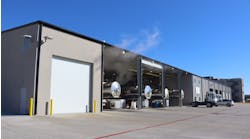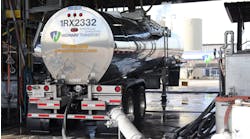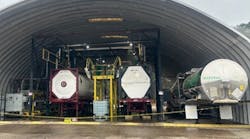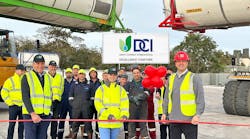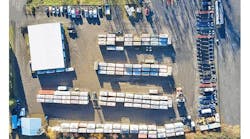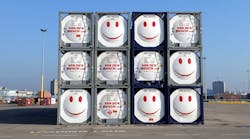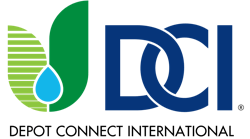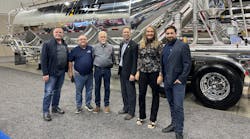HARKRADER Trucking Inc (HTI) is celebrating the 25th anniversary of its six-bay tank-wash facility in Oakland, California — which is rather amazing to owner John Harkrader, given that he never planned it.
He built the tank wash three years after starting his trucking company, Harkrader Trucking. His trucks hauled food-grade products and light-chemical commodities in the San Francisco Bay Area and surrounding counties.
The process of getting tank trucks cleaned in between loads could be long and costly. Not only was the tank truck delayed from completing the next load, but the driver had to be paid for the waiting period. It seemed like the natural course was to build his own tank wash rack — which would mean no waiting, and a lower cost for the cleaning.
“Shortly after we built our tank wash, the only other wash rack in the area was closed,” he says. “We were thrown all of the business in the bay area, and we went from 8 hours, 5 days a week to 24/7 to handle it all.
“We soon decided that tank cleaning was a much easier business to run, and more profitable than the trucking had been to us, so we sold the trucks and shifted all of our attention to the tank wash. I just lucked out, getting into this business. It wasn't my original plan.”
At its peak in the mid 1990s, HTI handled 150 trucks a week. But a number of food companies moved out of California, because of the high costs of labor, insurance, and land. This definitely impacted business, as the call for food-grade washes was drastically decreased.
These days, HTI handles 80 trucks a week. Harkrader isn't complaining, though.
“Business is not as great as it used to be,” he says, “but adjusting to changing times is a factor in any business. The gross amounts may have gone down but costs have also gone down. The costs of operating have been refined over the years. My profit margin today is the same as it was when I used to do twice as many trucks.”
As the years have gone by, the restrictions of the local publicly owned treatment works (POTW), East Bay MUD, have become more rigorous. Handling so many various food grade and chemical washes, HTI's waste stream has been different every day — even every minute. The biggest challenge became developing a treatment system to meet the environmental boundaries set by the Environmental Protection Agency (EPA) and East Bay MUD.
“We definitely paid our dues and fines over the years, trying to experiment with different treatment systems,” Harkrader says. “We finally came up with one that works pretty darned good. We haven't had a violation in seven years.
“We've worked with HydroTech Environmental in building a treatment system that uses a special powdered polymer to separate any hazardous content from our waste stream. The waste water is sent to a 15,000-gallon holding tank, the pH level is adjusted and the waste water is sent to the treatment machine. The hazardous elements are separated, removed and the water is sent to another holding tank. The final step takes the water through a carbon filter to remove any trace of hydrocarbon that may be present, before being released to the sewer district.
“Hydro Tech Environmental experimented with different blends of polymer to finally find the one that works for our waste stream. We experimented for five years to get the right blend, right pH, the right speed on the treatment machine, and the right carbon filter. It was all worth it.”
High pressure
High pressure
HTI is equipped to clean both liquid and dry-tank trailers, with high-volume, high-pressure, steam, hot and cold water, and detergent. It also provides caustic washes, as well as kosher washes. Some of HTI's services include cold/hot-water rinse, interior tank drying, pump and hose cleaning, detergent wash and rinse, and tank acid brightening.
”I always felt that high pressure is great, but you have to have volume to move the product,” Harkrader says. “Especially on a rear dump, where it has to travel so far, it doesn't do any good to knock the stuff off the walls with Roto-jets if it just lies on the bottom of the tank. You need volume to move it out. We use 30-horsepower motors that put out 360 gallons a minute, which also gives us the capability to run three Roto-jets at a time if necessary.”
The facility is equipped with a Clayton Steam Generator, a 4000-gallon stainless steel hot-water tank, a 3000-gallon detergent tank, a 3000-gallon stainless-steel cold-water tank, and a 3000-gallon stainless-steel chemical tank. Spinners are from Gamajet Cleaning Systems Inc.
Bays #1 and #2 are dedicated to food-grade washes. Bay #3 is dedicated to chemical washes only. Bay #4 is hot-water food grade only (no detergent). Two outdoor bays are for high-pressure washing, hand-padding and product-heating.
“We do a lot of acids, polymers, latexes, resins, and wax,” he says. “One the food side, we clean a lot of vegetable oil and juices.”
HTI offers a driver's room, fax/copy services, free Wi-Fi, single shower, quiet paved yard, lighted overnight parking, video camera security, drop and spot, and after hours and weekend appointments.
HTI's safety program includes weekly safety meetings and periodic safety classes. All employees are trained in forklift operation and safety, hazard communication awareness, respiratory protection, fall protection, driver safety, personal protective equipment use, hearing protection, injury and illness prevention, confined space safety, and back and spine safety. HTI uses an outside safety firm to administer its safety program.
“It's worked out really well,” he says. “Every once in awhile, you get a visit from EPA, HAZMAT, or OSHA. The best way to keep current and in compliance with all required safety standards is to use a company whose prime business is to know the latest laws and technologies of safety and hazardous material handling.”
What does the future hold for HTI? Harkrader says he expects the wash-rack business to remain pretty much the same, but he is trying to buy an adjacent one-acre property that would expand HTI's total to three acres.
“We have a number of out-of-the-area trucking companies that need a place to park their trucks and/or trailers,” he says. “These companies are doing a limited amount of business in our local area — not enough to warrant a full-on terminal. So they park their trucks and trailers at our facility. This enables them to pick up a clean trailer while dropping off a dirty one. It also allows us to clean when it's convenient for us. We don't charge them to park here; it's a win/win situation for both of us. We end up doing more washes, since they don't have to wait, and they end up doing more loads.”
Harkrader says there's no magic formula for his business success. He just works hard to give companies what they want and need.
“We've been dealing with all the major companies,” he says, “and we haven't had any complaints. I guess that's why we've been in business 25 years.”
